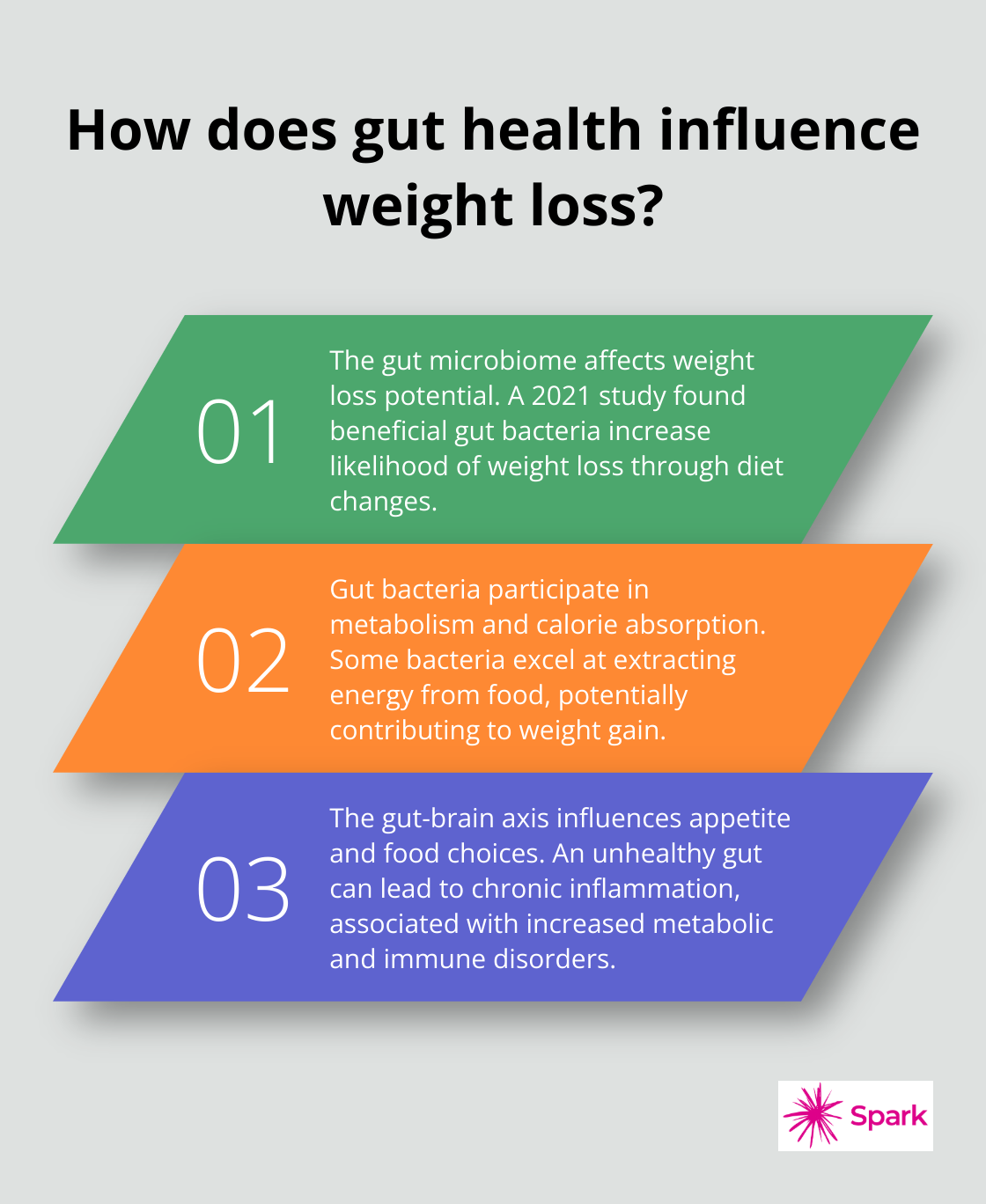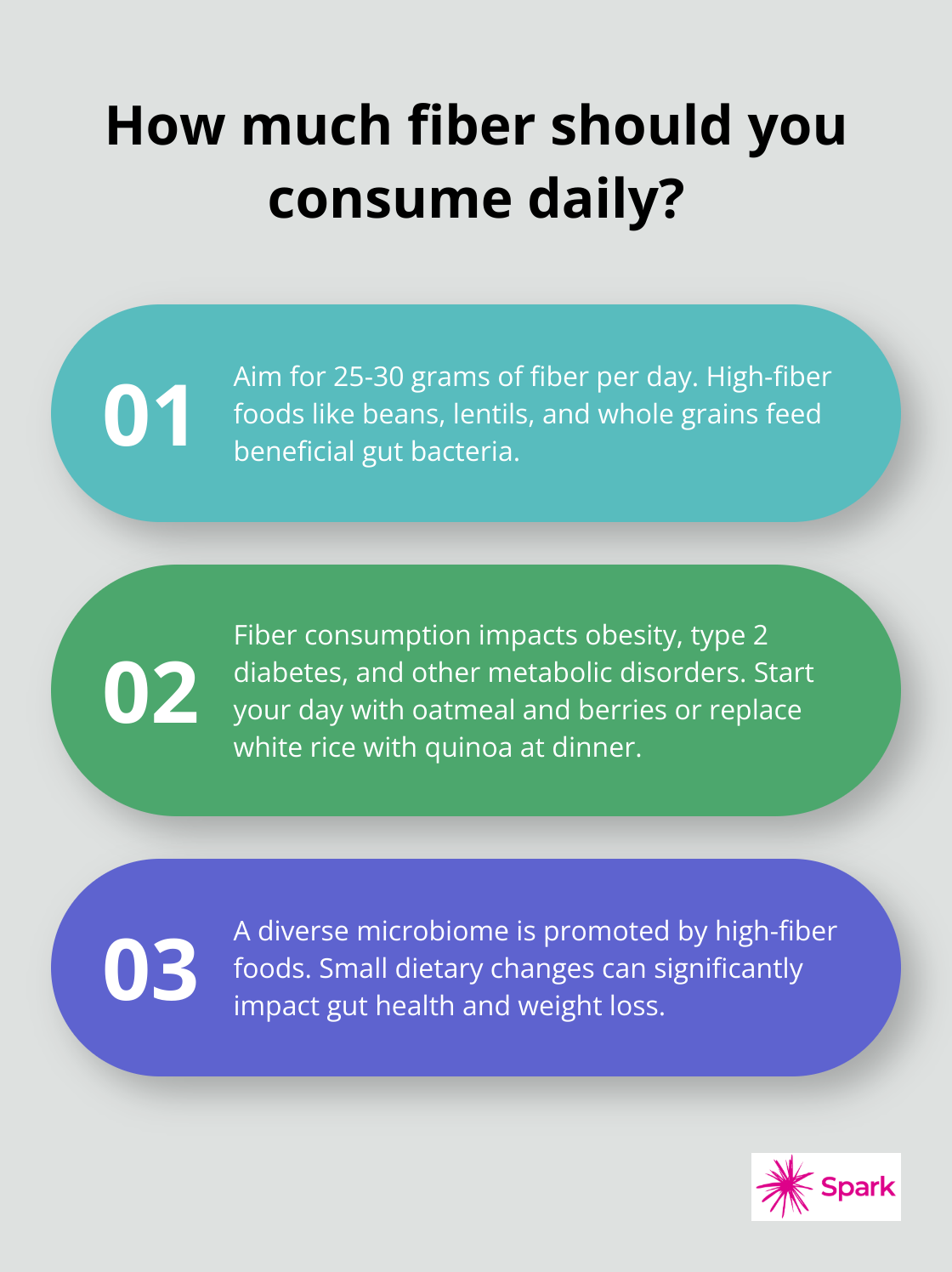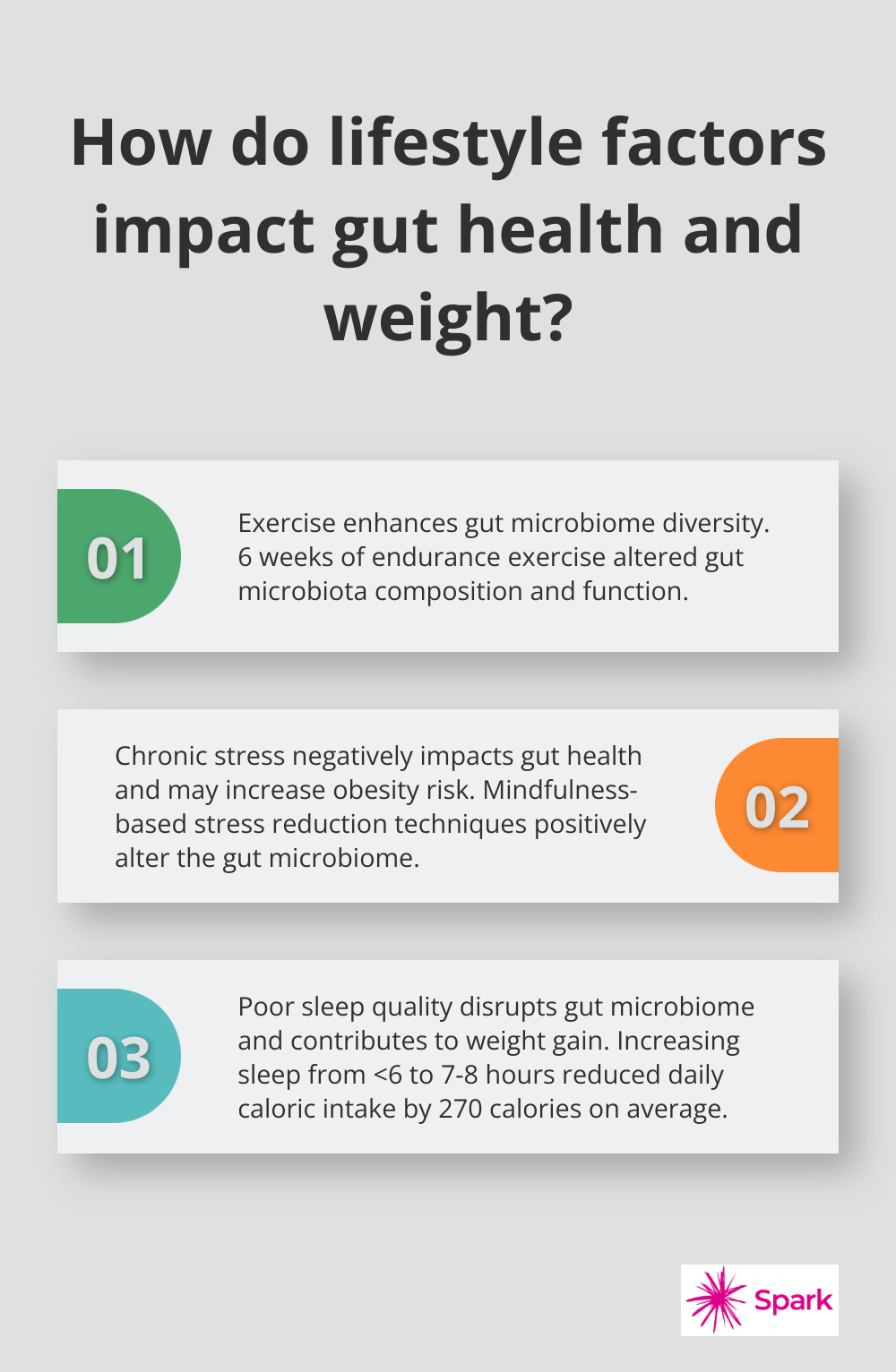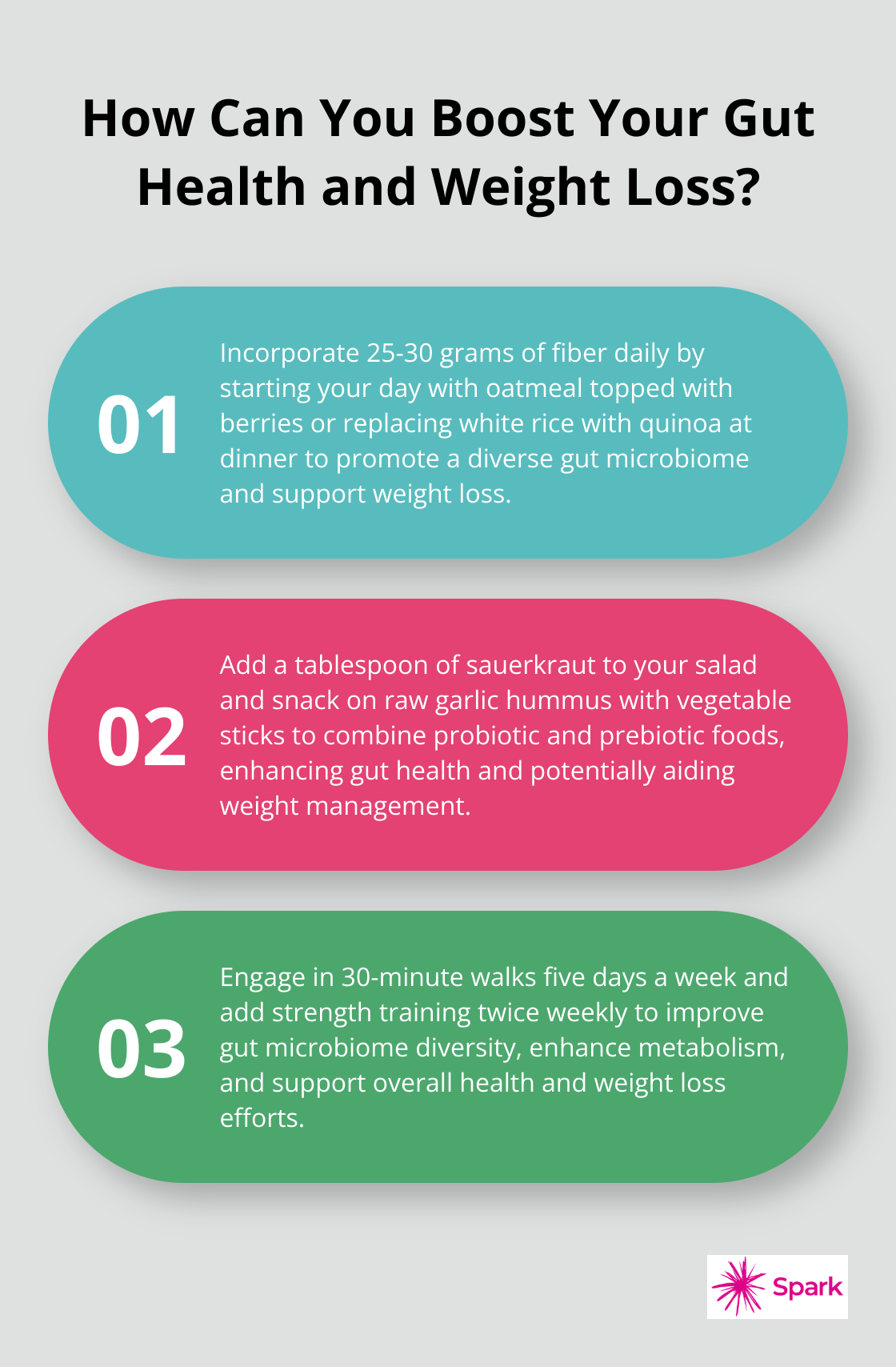At Spark Healthcare, we’re fascinated by the intricate connection between gut health and weight loss. This link has become a hot topic in the world of nutrition and wellness.
Recent studies show that the bacteria in our gut play a crucial role in how we metabolize food and store fat. Understanding this relationship could be the key to unlocking more effective weight management strategies.
How Gut Health Affects Weight
The Gut Microbiome: Your Weight’s Hidden Influencer
Your gut houses trillions of microorganisms, collectively known as the gut microbiome. These tiny inhabitants play a significant role in how your body processes food and stores fat. A 2021 study published in mSystems found that individuals with beneficial gut bacteria had a higher likelihood of losing weight through dietary changes.
Metabolism and Your Microbes
The bacteria in your gut actively participate in your metabolism. They help break down food, produce essential nutrients, and influence how many calories you absorb from your meals. Some gut bacteria excel at extracting energy from food, which can contribute to weight gain if they become too abundant.
The Gut-Brain Connection
Your gut microbiome communicates with your brain, affecting your appetite and food choices. The gut-brain axis plays a pivotal role in the finely tuned orchestration of food intake, where both homeostatic and hedonic processes collaboratively control eating behavior.
Inflammation: The Silent Weight Gain Trigger
An unhealthy gut can lead to chronic inflammation in your body. Altered gut microbial ecosystems have been associated with increased metabolic and immune disorders in animals and humans.
Practical Steps for a Healthier Gut
To improve your gut health and potentially boost your weight loss efforts, consider these actionable tips:
- Eat a diverse range of foods to promote bacterial diversity.
- Include fermented foods (like yogurt and kefir) in your diet for natural probiotics.
- Choose high-fiber foods to feed your beneficial gut bacteria.
- Limit processed foods and added sugars, which can harm gut health.
- Stay hydrated to support your gut’s mucosal lining.

Everyone’s gut microbiome is unique. What works for one person might not work for another. This uniqueness underscores the importance of personalized approaches to health and weight management.
As we explore the intricate relationship between gut health and weight, it becomes clear that our dietary choices play a significant role. Let’s examine how specific foods can impact both our gut health and our weight loss efforts.
How Your Diet Shapes Your Gut and Weight
The Power of Fiber
Fiber consumption has contributed to the global epidemic of obesity, type 2 diabetes, and other metabolic disorders. High-fiber foods (such as beans, lentils, and whole grains) feed beneficial gut bacteria, promoting a diverse microbiome.

Try to consume 25-30 grams of fiber daily. Start your day with oatmeal topped with berries, or replace white rice with quinoa at dinner. These small changes can significantly impact your gut health and weight loss journey.
Probiotics and Prebiotics: A Powerful Combination
Probiotics are live beneficial bacteria found in fermented foods like yogurt, kefir, and sauerkraut. They balance your gut microbiome and can assist with weight loss. A meta-analysis showed no significant decrease in body weight after probiotic supplementation.
Prebiotics, in contrast, serve as food for these beneficial bacteria. Foods like garlic, onions, and asparagus contain prebiotics that help your good gut bacteria thrive. A study in the American Journal of Clinical Nutrition found that prebiotic fiber increased feelings of fullness and reduced calorie intake.
For optimal gut health, incorporate both probiotic and prebiotic foods into your diet. Add a tablespoon of sauerkraut to your salad and snack on raw garlic hummus with vegetable sticks.
Foods to Avoid for Gut Health
While certain foods nourish your gut, others can harm it. Processed foods, artificial sweeteners, and excessive alcohol can disrupt your gut microbiome balance. A study in the journal Nature found that artificial sweeteners altered gut bacteria in ways that could increase glucose intolerance.
Reduce your intake of sugary drinks, refined carbohydrates, and processed meats. Focus on whole, unprocessed foods instead. Replace soda with unsweetened tea or water infused with fresh fruits. Choose whole grain alternatives over white bread. These changes can significantly improve your gut health and support your weight loss efforts.
The Gut-Brain Connection in Eating Behavior
Your diet not only affects your gut health but also influences your brain’s response to food. The gut-brain axis plays a key role in regulating food intake, where both homeostatic and hedonic processes control eating behavior. Lesions in the hypothalamus, in both humans and animals can lead to increases in appetite, food ingestion and weight gain.
As we explore the relationship between diet, gut health, and weight, it becomes clear that lifestyle factors also play a significant role. Let’s examine how exercise, stress management, and sleep quality can further impact your gut health and weight loss journey.
How Lifestyle Shapes Your Gut and Weight
Your gut health and weight depend on more than just your diet. Exercise, stress, and sleep significantly influence your gut microbiome and, as a result, your weight.
Exercise: A Boost for Your Gut
Regular physical activity enhances your gut microbiome diversity. Recent studies suggest that exercise can increase the number of beneficial microbial species, enrich the microflora diversity, and improve the development of commensal bacteria. This diversity correlates with improved overall health and metabolism.

You don’t need to be a professional athlete to benefit. Moderate exercise can make a difference. Research in the journal Nutrients demonstrated that six weeks of endurance exercise altered the gut microbiota’s composition and function, even without dietary changes.
Start with a 30-minute walk five days a week. Increase the intensity and duration as your fitness improves. Add strength training twice weekly to further enhance your metabolism and gut health.
Stress: The Hidden Gut Enemy
Chronic stress negatively impacts your gut health and weight. It alters gut microbiome composition, potentially causing inflammation and weight gain. A study in Brain, Behavior, and Immunity found that stress-induced changes in the gut microbiome may increase obesity risk.
To combat stress, incorporate mindfulness into your daily routine. Research in Psychoneuroendocrinology showed that mindfulness-based stress reduction techniques positively alter the gut microbiome.
Try a 10-minute daily meditation session (using apps like Headspace or Calm). Practice deep breathing exercises during work breaks. These simple techniques can significantly reduce stress and its negative impact on your gut and weight.
Sleep: Your Weight Loss Ally
Poor sleep quality disrupts your gut microbiome and contributes to weight gain. A study in Molecular Metabolism found that just two nights of partial sleep deprivation altered the gut microbiota in ways that promote obesity and metabolic diseases.
Try to get 7-9 hours of quality sleep each night. Establish a consistent sleep schedule, even on weekends. Create a relaxing bedtime routine: dim the lights, avoid screens an hour before bed, and consider reading a book or practicing gentle yoga to wind down.
Improving your sleep habits can profoundly affect your gut health and weight management efforts. Research in the journal Sleep found that individuals who increased their sleep duration from less than 6 hours to 7-8 hours per night reduced their daily caloric intake by an average of 270 calories.
These lifestyle factors (exercise, stress management, and sleep) work together with diet to shape your gut health and weight. Addressing these areas supports your weight loss efforts and improves your overall health and well-being.
Final Thoughts
The connection between gut health and weight loss is clear. Your gut microbiome influences metabolism, appetite regulation, and overall health. Diet, exercise, stress management, and sleep all shape your gut health and, as a result, your weight. Improving your gut health can transform your weight loss journey. You should diversify your diet, exercise regularly, manage stress, and ensure quality sleep to support a healthy gut environment.

The potential of gut-focused approaches in weight management shows promise. Nurturing a healthy gut microbiome supports weight loss efforts and improves overall health and well-being. Everyone’s gut microbiome differs, which highlights the need for personalized approaches to health and weight management. Research in this field continues to evolve, indicating that attention to gut health could be key in achieving and maintaining a healthy weight.
At Spark Healthcare, we recognize that factors like gut health can significantly impact mental health. If you struggle with mental health issues that affect your weight loss journey, you should consider reaching out to Spark Mental Health for support. A holistic approach that considers your gut health sets you up for long-term success in your weight management goals.






